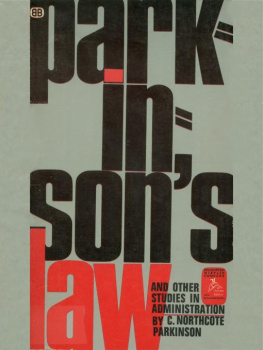C. Parkinson - Parkinson's Law and Other Studies in Administration
Here you can read online C. Parkinson - Parkinson's Law and Other Studies in Administration full text of the book (entire story) in english for free. Download pdf and epub, get meaning, cover and reviews about this ebook. genre: Humor. Description of the work, (preface) as well as reviews are available. Best literature library LitArk.com created for fans of good reading and offers a wide selection of genres:
Romance novel
Science fiction
Adventure
Detective
Science
History
Home and family
Prose
Art
Politics
Computer
Non-fiction
Religion
Business
Children
Humor
Choose a favorite category and find really read worthwhile books. Enjoy immersion in the world of imagination, feel the emotions of the characters or learn something new for yourself, make an fascinating discovery.

- Book:Parkinson's Law and Other Studies in Administration
- Author:
- Genre:
- Rating:5 / 5
- Favourites:Add to favourites
- Your mark:
- 100
- 1
- 2
- 3
- 4
- 5
Parkinson's Law and Other Studies in Administration: summary, description and annotation
We offer to read an annotation, description, summary or preface (depends on what the author of the book "Parkinson's Law and Other Studies in Administration" wrote himself). If you haven't found the necessary information about the book — write in the comments, we will try to find it.
Parkinson's Law and Other Studies in Administration — read online for free the complete book (whole text) full work
Below is the text of the book, divided by pages. System saving the place of the last page read, allows you to conveniently read the book "Parkinson's Law and Other Studies in Administration" online for free, without having to search again every time where you left off. Put a bookmark, and you can go to the page where you finished reading at any time.
Font size:
Interval:
Bookmark:
PARKINSONS LAW AND OTHER STUDIES IN ADMINISTRATION
C. Northcote Parkinson
for Ann
PREFACE
TO THE VERY YOUNG, to schoolteachers, as also to those who compile textbooks about constitutional history, politics, and current affairs, the world is a more or less rational place. They visualize the election of representatives, freely chosen from among those the people trust. They picture the process by which the wisest and best of these become ministers of state. They imagine how captains of industry, freely elected by shareholders, choose for managerial responsibility those who have proved their ability in a humbler role. Books exist in which assumptions such as these are boldly stated or tacitly implied. To those, on the other hand, with any experience of affairs, these assumptions are merely ludicrous.
Solemn conclaves of the wise and good are mere figments of the teachers mind. It is salutary, therefore, if an occasional warning is uttered on this subject. Heaven forbid that students should cease to read books on the science of public or business administration provided only that these works are classified as fiction. Placed between the novels of Rider Haggard and H. G. Wells, intermingled with volumes about ape men and space ships, these textbooks could harm no one. Placed elsewhere, vii among works of reference, they can do more damage than might at first sight seem possible.
Dismayed to realize what other people suppose to be the truth about civil servants or building plans, I have occasionally tried to provide, for those interested, a glimpse of reality. The reader of discrimination will guess that these glimpses of the truth are based on no ordinary experience.
In the expectation, moreover, that some readers will have less discrimination than others, I have been careful to hint, occasionally, casually, at the vast amount of research upon which my theories are founded.
Let the reader picture to himself the wall charts, card index cabinets, calculating machines, slide rules, and reference works that may be thought the indispensable background to a study such as this. Let him then be assured that the reality dwarfs all his imagining, and that the truths here revealed are the work not merely of an admittedly gifted individual but of a vast and costly research establishment. An occasional reader may feel that more detailed description should have been given of the experiments and calculations upon which these theories rest. Let him reflect, however, that a volume so elaborate would take longer to read and cost more to buy.
While it is undeniable that each one of these essays embodies the results from years of patient investigation, it must not be supposed that all has yet been told. The recent discovery in a certain field of warfare that the number of the enemy killed varies inversely with the number of generals on ones own side has opened a whole new field of research. A new significance has been quite recently attributed to the illegibility of signatures, the attempt being made to fix the point in a successful executive career at viii which the handwriting becomes meaningless even to the executive himself. New developments occur almost daily, making it virtually certain that later editions of this work will quickly supersede the first.
I wish to thank the editors who have given permission to reprint certain of these essays. Pride of place must go to the editor of The Economist, the journal in which Parkinsons law was first revealed to mankind. To the same editor I am indebted for permission to reprint the essay on Directors and Councils, as also that on Pension Point. Certain of the other articles have also appeared previously in Harpers Magazine and The Reporter.
To the artist, Robert C. Osborn, I am deeply grateful for adding a touch of frivolity to a work that might otherwise have seemed too technical for the general reader. To the publishers I am indebted for their encouragement, without which I should have attempted little and achieved still less. Last of all, I place on record the gratitude I feel toward the higher mathematician with whose science the reader is occasionally blinded and to whom (but for other reasons) this book is dedicated.
C. NORTHCOTE PARKINSON
Singapore
1957
1. PARKINSONS LAW, OR THE RISING PYRAMID
WORK EXPANDS so as to fill the time available for its completion.
General recognition of this fact is shown in the proverbial phrase It is the busiest man who has time to spare. Thus, an elderly lady of leisure can spend the entire day in writing and dispatching a postcard to her niece at Bognor Regis. An hour will be spent in finding the postcard, another in hunting for spectacles, half an hour in a search for the address, an hour and a quarter in composition, and twenty minutes in deciding whether or not to take an umbrella when going to the mailbox in the next street. The total effort that would occupy a busy man for three minutes all told may in this fashion leave another person prostrate after a day of doubt, anxiety, and toil.
Granted that work (and especially paperwork) is thus elastic in its demands on time, it is manifest that there need be little or no relationship between the work to be done and the size of the staff to which it may be assigned. A lack of real activity does not, of necessity, result in leisure.
A lack of occupation is not necessarily revealed by a manifest idleness. The thing to be done swells in importance and complexity in a direct ratio with the time to be spent. This fact is widely recognized, but less attention has been paid to its wider implications, more especially in the field of public administration. Politicians and taxpayers have assumed (with occasional phases of doubt) that a rising total in the number of civil servants must reflect a growing volume of work to be done. Cynics, in questioning this belief, have imagined that the multiplication of officials must have left some of them idle or all of them able to work for shorter hours. But this is a matter in which faith and doubt seem equally misplaced. The fact is that the number of the officials and the quantity of the work are not related to each other at all. The rise in the total of those employed is governed by Parkinsons Law and would be much the same whether the volume of the work were to increase, diminish, or even disappear. The importance of Parkinsons Law lies in the fact that it is a law of growth based upon an analysis of the factors by which that growth is controlled.
The validity of this recently discovered law must rest mainly on statistical proofs, which will follow. Of more interest to the general reader is the explanation of the factors underlying the general tendency to which this law gives definition. Omitting technicalities (which are numerous) we may distinguish at the outset two motive forces. They can be represented for the present purpose by two almost axiomatic statements, thus: (1) An official wants to multiply subordinates, not rivals and (2) Officials make work for each other.
To comprehend Factor 1, we must picture a civil servant, called A, who finds himself overworked. Whether this overwork is real or imaginary is immaterial, but we should observe, in passing, that As sensation (or illusion) might easily result from his own decreasing energy: a normal symptom of middle age. For this real or imagined overwork there are, broadly speaking, three possible remedies. He may resign; he may ask to halve the work with a colleague called B; he may demand the assistance of two subordinates, to be called C and D. There is probably no instance in history, however, of A choosing any but the third alternative. By resignation he would lose his pension rights. By having B appointed, on his own level in the hierarchy, he would merely bring in a rival for promotion to Ws vacancy when W (at long last) retires. So A would rather have C and D, junior men, below him. They will add to his consequence and, by dividing the work into two categories, as between C and D, he will have the merit of being the only man who comprehends them both. It is essential to realize at this point that C and D are, as it were, inseparable. To appoint C alone would have been impossible. Why? Because C, if by himself, would divide the work with A and so assume almost the equal status that has been refused in the first instance to B; a status the more emphasized if C is As only possible successor. Subordinates must thus number two or more, each being thus kept in order by fear of the others promotion. When C complains in turn of being overworked (as he certainly will) A will, with the concurrence of C, advise the appointment of two assistants to help C. But he can then avert internal friction only by advising the appointment of two more assistants to help D, whose position is much the same. With this recruitment of E, F, G, and H the promotion of A is now practically certain.
Font size:
Interval:
Bookmark:
Similar books «Parkinson's Law and Other Studies in Administration»
Look at similar books to Parkinson's Law and Other Studies in Administration. We have selected literature similar in name and meaning in the hope of providing readers with more options to find new, interesting, not yet read works.
Discussion, reviews of the book Parkinson's Law and Other Studies in Administration and just readers' own opinions. Leave your comments, write what you think about the work, its meaning or the main characters. Specify what exactly you liked and what you didn't like, and why you think so.








